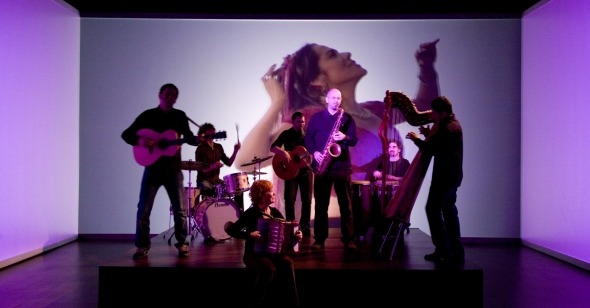A Song-and-Dance Man
By Michael Koresky
Fados
Dir. Carlos Saura, Spain, New Yorker Films
Adorned in oranges, purples, and golds, and unfolding on shimmering soundstages flanked by scrims and screens of varying sizes, Fados creates a universe unto itself, an enclosed festival space meant to stand in for an entire world of song. This is the norm for the brilliant Spanish director Carlos Saura, who for nearly thirty years has built a parallel film career (to his more conventional dramatic one) as a charter of musical traditions. After his “flamenco trilogy,” all collaborations with the late, great dancer and choreographer Antonio Gades, in which he was working through his notions of how to convey dance and movement on screen (Blood Wedding, Carmen, and El amor brujo are all dazzling, self-consciously movie-movie deconstructions as much as filmed flamenco ballets), Saura then moved on to the straightforwardly titled “Flamenco” and “Tango,” both immense popular successes. Fados, which takes its title from a tradition of emotive, melancholy singing derived in the poor port-side areas of early nineteenth-century Lisbon (but with African and Brazilian origins), and which has survived into various modern incarnations, rounds out this second trilogy.
Shot with seamless dexterity by two cinematographers, José Luis Lopez-Linares (who lensed Saura’s typically theatrical productions Iberia and Salome) and Eduardo Serra (the director of photography on everything from Shyamalan’s gorgeous Unbreakable to Vermeer-aping Girl with a Pearl Earring), Fados is saturated in visual artificiality, all the better to provide colorful contrast with the heartfelt, authentic performances at its center. Essentially a non-narrative of songs strung together to feature length (the less hospitable will call it a glossy music-video compilation), Saura’s film incorporates such fado subgenres as flamenco and hip-hop into its presentation of Portugal’s most symbolic national music genre. If you get on its wavelength, it’s a rousing affair, by nature more celebratory than instructive—which is both a credit and a criticism, as the uninitiated will be baffled at the parade of unfamiliar faces, past and present, but they will have no choice but to submit to the engaging moment.
One could cite Saura’s choice to return to his well-practiced realm of documenting music as unadventurous at this stage in his career; I prefer to remain heartened by his unwavering fascination with musical expression in various forms. Now at age 77, Saura seems able to put forth such visually luxurious films with almost mechanical precision, and certainly Fados, which was unsurprisingly in part a commission from the Portuguese tourism board, seems easily served as an exotic export for foreign viewers, but the loving attention to detail he shows here, as in his other music films, now betrays an almost grandfatherly devotion to his subject.
From its opening visual coup, in which endless silhouettes of people walk in profile along large screens projecting images of others, possibly from an earlier time, moving head-on towards the camera, to its smooth but grandiose final crane shot which reveals the workers, tracks, and wardrobe surrounding the set (in a neat reversal of El amor brujo’s stunning opener), Fados is not just decorative but immersive. In between we get appearances from, of course, Caetano Veloso, and contemporary, Mozambique-born star Mariza, plus eloquent, unadorned tributes to fado legends Maria Severa and Amalia Rodrigues. The latter makes for one of Saura’s most memorable passages, as archived footage of this proclaimed “Queen of Fado,” rehearsing piano-side, appears on an enormous screen as dancers and singers stare up, their backs to the camera. Saura then beautifully segues, tracking his camera right, to a room constructed of screens projecting ghostly images of Rodrigues, as dancers romantically entwine before them. It’s grandly theatrical, and perhaps not unexpected as a visual conceit, but there’s something unutterably touching about such gorgeous icon-making, wrought from such basic ingredients as song and guitar.
